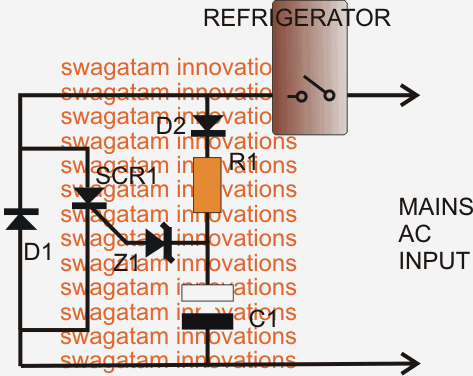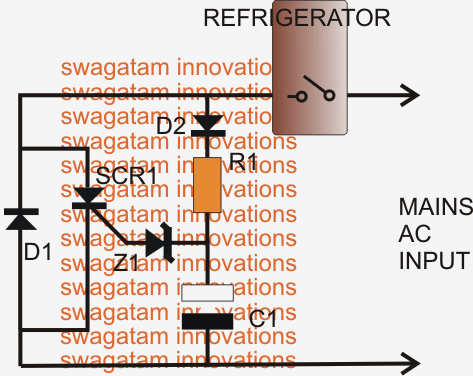Refrigerators tend to draw appreciable amounts of current each time their compressor switch ON, and this could happen many times per day. A soft start circuit to the compressor motor could probably tackle this issue and help save electricity. The idea was requested by Mr. Naeem Khan.
Technical Specifications
I need your help regarding to control the starting torque(soft start) of the Refrigerator Compressor for energy saving purpose. All these compressor are capacitor start type. If you have any other idea to control these capacitor start compressor RPM then let me know.
Awaiting your reply soon.
The Design
The capacitor in a capacitor start motor has nothing to do with the speed of the motor. The capacitor is there just to energize the field coil of the motor for helping the main winding to start the rotation, after which it's cut-of from the system.
In any case, the soft start circuit presented here is irrelevant to the type of AC motor used, it should hopefully work for all types of motor.
Referring to the figure we see an arrangement where the refrigerator is wired in series with a rectifier diode which has an SCR connected in parallel.
The operation is rather simple.
How the Circuit Operates
As soon as the internal relay of the refrigerator clicks ON, diode D1 provides a half wave AC to the refrigerator forcing a slow soft start to the motor, the SCR is unable to conduct immediately due to the the presence of the capacitor at its gate.
Therefore at the start, the refrigerator is able to get only a half wave AC through the rectifier diode, until the capacitor across the SCR gate/cathode charges up and fires the SCR.
During this period the half wave AC allows only around 50% of initial voltage to the refrigerator, providing a soft start to the motor, until within seconds the SCRs fires and restores full available power to the motor.
Once the SCR is fired it takes on the other half of the AC so that the refrigerator motor is able to gain its full rated torque.
Circuit Diagram

Parts List
R1 = 47K 1watt
D1 = 6 amp diode
D2 = 1N4007
Z1 = 50V 1 watt zener
C1 = 10uF/400V
Switch ON Starting Power Calculation
Since initially the series diode converts the AC input into a half wave DC, it's important to know the average DC applied at the particular instant. It may be calculated using the formula:
Vdc av = Vp/π
where π = 3.1416, and Vp = peak half wave value
The π value may be solved and the above formula may be further expressed as:
Vdc av = 0.318 Vp
The peak voltage may be calculated by using the following formula:
peak volts = RMS volts x 1.414
therefore we get:
Vp = Vrms x 1.414
For a 220V RMS, the above formula could be solved as:
Vp = 220 x 1.414 = 311.08V
For accuracy we can also include the 0.7V drop produced by the diode in our calculation:
Vdc av = (VP - 0.7)/π
Solving the above equation with Vp = 311.08, we get:
Vdc av = (311.08 - 0.7)/π = 98.84V
If the refrigerator motor coil resistance is known the above DC average voltage could be used for calculating the initial soft-start power consumed by the motor, through the following formula:
P = I2R, where P stands for power,
I = current (amps) and R = resistance of the motor coil
I (amps) could be found by applying Ohms law:
IDC = VDC /R,
where R = resistance of the motor coil, and VDC = 98.84V obtained from the previous calculations. where π = 3.1416.
Warning: The circuit has not been tested or verified practically, and the effects are unknown. Initially try the circuit by using a 200watt bulb. The bulb should brighten up slowly in comparison to when it's connected directly to mains.
Also the entire circuit is directly linked with mains and is therefore extremely dangerous while plugged in and without an enclosure.
